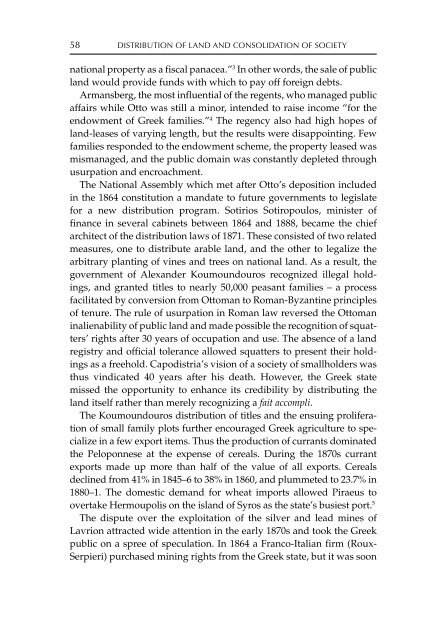MODERN GREECE: A History since 1821 - Amazon Web Services
MODERN GREECE: A History since 1821 - Amazon Web Services
MODERN GREECE: A History since 1821 - Amazon Web Services
Create successful ePaper yourself
Turn your PDF publications into a flip-book with our unique Google optimized e-Paper software.
58 DISTRIBUTION OF LAND AND CONSOLIDATION OF SOCIETY<br />
national property as a fiscal panacea.” 3 In other words, the sale of public<br />
land would provide funds with which to pay off foreign debts.<br />
Armansberg, the most influential of the regents, who managed public<br />
affairs while Otto was still a minor, intended to raise income “for the<br />
endowment of Greek families.” 4 The regency also had high hopes of<br />
land-leases of varying length, but the results were disappointing. Few<br />
families responded to the endowment scheme, the property leased was<br />
mismanaged, and the public domain was constantly depleted through<br />
usurpation and encroachment.<br />
The National Assembly which met after Otto’s deposition included<br />
in the 1864 constitution a mandate to future governments to legislate<br />
for a new distribution program. Sotirios Sotiropoulos, minister of<br />
finance in several cabinets between 1864 and 1888, became the chief<br />
architect of the distribution laws of 1871. These consisted of two related<br />
measures, one to distribute arable land, and the other to legalize the<br />
arbitrary planting of vines and trees on national land. As a result, the<br />
government of Alexander Koumoundouros recognized illegal holdings,<br />
and granted titles to nearly 50,000 peasant families – a process<br />
facilitated by conversion from Ottoman to Roman-Byzantine principles<br />
of tenure. The rule of usurpation in Roman law reversed the Ottoman<br />
inalienability of public land and made possible the recognition of squatters’<br />
rights after 30 years of occupation and use. The absence of a land<br />
registry and official tolerance allowed squatters to present their holdings<br />
as a freehold. Capodistria’s vision of a society of smallholders was<br />
thus vindicated 40 years after his death. However, the Greek state<br />
missed the opportunity to enhance its credibility by distributing the<br />
land itself rather than merely recognizing a fait accompli.<br />
The Koumoundouros distribution of titles and the ensuing proliferation<br />
of small family plots further encouraged Greek agriculture to specialize<br />
in a few export items. Thus the production of currants dominated<br />
the Peloponnese at the expense of cereals. During the 1870s currant<br />
exports made up more than half of the value of all exports. Cereals<br />
declined from 41% in 1845–6 to 38% in 1860, and plummeted to 23.7% in<br />
1880–1. The domestic demand for wheat imports allowed Piraeus to<br />
overtake Hermoupolis on the island of Syros as the state’s busiest port. 5<br />
The dispute over the exploitation of the silver and lead mines of<br />
Lavrion attracted wide attention in the early 1870s and took the Greek<br />
public on a spree of speculation. In 1864 a Franco-Italian firm (Roux-<br />
Serpieri) purchased mining rights from the Greek state, but it was soon


